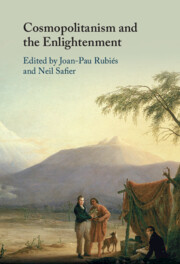Book contents
- Cosmopolitanism and the Enlightenment
- Cosmopolitanism and the Enlightenment
- Copyright page
- Dedication
- Contents
- Figures
- Contributors
- Preface
- Acknowledgments
- Introduction
- 1 Enlightenment Cosmopolitanism in Perspective
- 2 The Cosmopolitan Paradox
- 3 Diderot’s Conjectural History and the History of “Monstrous Nature”
- 4 Geographies of Cosmopolitanism
- 5 The Imperial, Global (Cosmopolitan) Dimensions of Nonelite Colonial Scribal Cultures in the Early Modern Iberian Atlantic
- 6 Gendered Cosmopolitanism?
- 7 Cosmopolitanism and the Creation of Patriotic Identities in the European Enlightenment
- 8 A Cosmopolitanism of Countervailing Powers
- 9 Cosmopolitanism and Civil War
- Afterword
- Index
5 - The Imperial, Global (Cosmopolitan) Dimensions of Nonelite Colonial Scribal Cultures in the Early Modern Iberian Atlantic
Published online by Cambridge University Press: 16 March 2023
- Cosmopolitanism and the Enlightenment
- Cosmopolitanism and the Enlightenment
- Copyright page
- Dedication
- Contents
- Figures
- Contributors
- Preface
- Acknowledgments
- Introduction
- 1 Enlightenment Cosmopolitanism in Perspective
- 2 The Cosmopolitan Paradox
- 3 Diderot’s Conjectural History and the History of “Monstrous Nature”
- 4 Geographies of Cosmopolitanism
- 5 The Imperial, Global (Cosmopolitan) Dimensions of Nonelite Colonial Scribal Cultures in the Early Modern Iberian Atlantic
- 6 Gendered Cosmopolitanism?
- 7 Cosmopolitanism and the Creation of Patriotic Identities in the European Enlightenment
- 8 A Cosmopolitanism of Countervailing Powers
- 9 Cosmopolitanism and Civil War
- Afterword
- Index
Summary
If one considers the Kantian cosmopolitan to be the result of political and cultural forces specific to Western European societies, then it is no more than a situated form of local knowledge. There were other forms of local globalism that were as situated as the Kantian cosmopolitan. The difference is that the forms of Catholic local globalism that I discuss here never became normative and universal. Moreover, the forms of local globalism explored in this essay never acquired the geopolitical epistemological authority to cast Kant as a parochial Prussian whose ideas were no more than one version of local globalism. In an unexpected turn, the Enlightenment notion of the cosmopolitan acquires the epistemological authority to cast the Black, nuns, and Indigenous intellectuals explored in this piece as parochial and local. This essay offers an alternative to early-modern forms of the local “cosmopolitan,” namely, individuals who often did travel physically more than Kant, with the exception of a few nuns who, like our Prussian, imagined the globe as a whole by firmly staying in one place.
- Type
- Chapter
- Information
- Cosmopolitanism and the Enlightenment , pp. 144 - 176Publisher: Cambridge University PressPrint publication year: 2023
- 1
- Cited by

